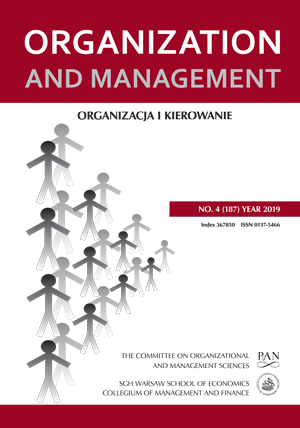APPROACH TO INTERPERSONAL CONFLICTS IN WORKPLACE AND WORK ENGAGEMENT
APPROACH TO INTERPERSONAL CONFLICTS IN WORKPLACE AND WORK ENGAGEMENT
Author(s): Tomasz GigolSubject(s): Business Economy / Management, Organizational Psychology, Management and complex organizations, Human Resources in Economy
Published by: Szkoła Główna Handlowa w Warszawie
Keywords: conflict management; work engagement; job satisfaction;
Summary/Abstract: Interpersonal conflict at work causes negative consequences such as lowered self-esteem, stress or burnout that intensify when passive approach to conflict is preferred. Therefore, we decided to examine the correlations between the preferred method of conflict management in the workplace and work engagement. We formulated a hypothesis that an active approach to interpersonal conflict management in the workplace influences work engagement. We conducted a quantitative questionnaire study on a group of 786 respondents. As regards conflict management, the theoretical basis was the dual concern model by de Dru et al. [2003] supplemented by the papers by Dijkstra et al. [2009]. In the study, the concept of engagement by Schaufeli et al. [2002] was adopted. It seems that examination of conflict management methods in an organization as a factor that affects work engagement is pioneering and expands knowledge on work engagement. What is more, the influence of conflict management on job satisfaction and the intercorrelations between work engagement and job satisfaction were studied. A hypothesis concerning the influence exerted by the active approach to interpersonal conflict has been confirmed in research. A statistically significant influence of active conflict management over all work engagement components, that is, vigor, dedication, and absorption, was noticed. Examination of satisfaction, in turn, confirmed previous studies in this respect. Research results reinforce scepticism about the frequent conflict management style through avoiding or yielding. If employee engagement is a desirable state in an organization, active conflict management should not be disregarded. A postulated practical conclusion from the study is that active conflict management should be taught in training programs for managers and academic courses for future managers.
Journal: Organizacja i Kierowanie
- Issue Year: 185/2019
- Issue No: 2
- Page Range: 25-41
- Page Count: 17
- Language: English

